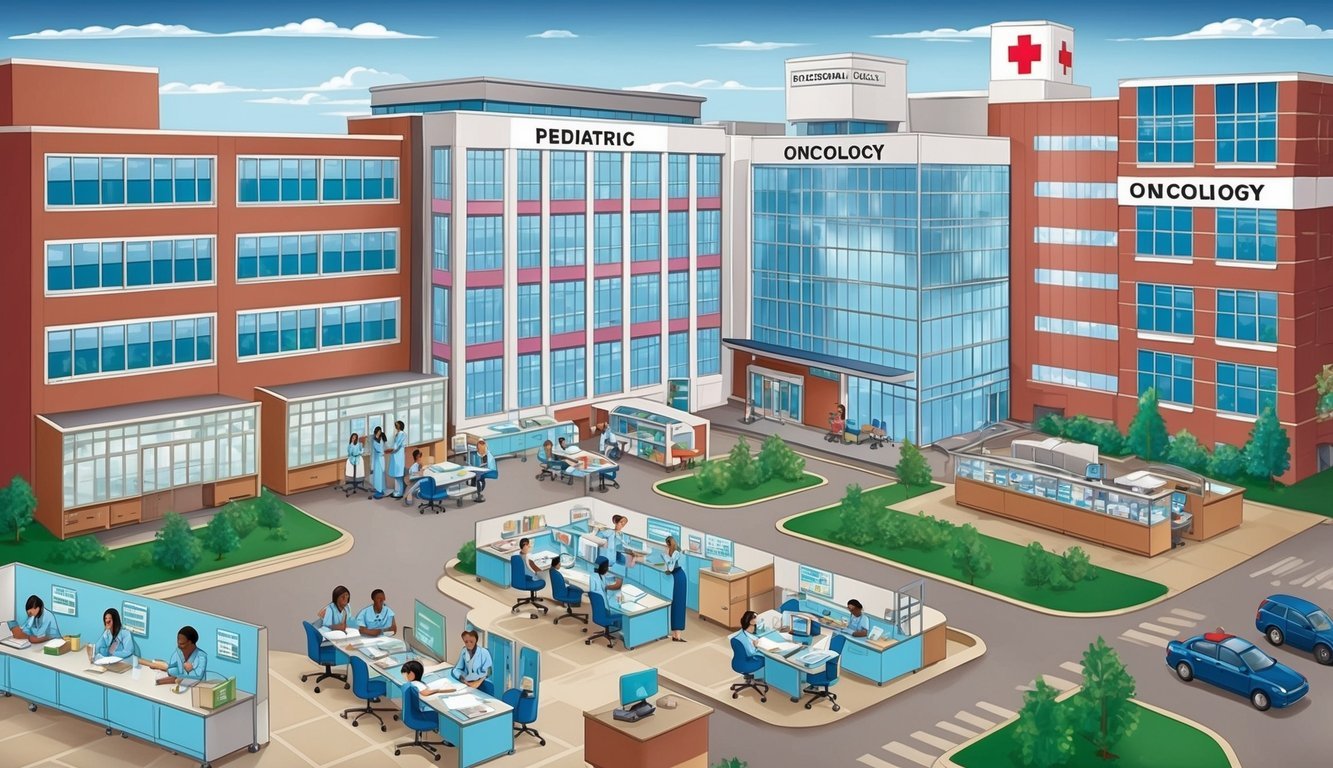Becoming a nurse is a rewarding and fulfilling career choice in the healthcare profession.
The amount of schooling required depends on the level of nursing you wish to pursue.
For example, a Certified Nursing Assistant (CNA) can complete their training in a few months, while earning a Bachelor of Science in Nursing (BSN) typically takes four years.
Each educational pathway prepares you for different roles within nursing, affecting not only your skills but also your job prospects.
After completing your education, you will need to pass the NCLEX-RN exam to obtain your nursing license.
Continuing education plays an important role in advancing your career and opening up various specialization options.
Key Takeaways
- The time to become a nurse varies by level, from months for a CNA to four years for a BSN.
- Licensure is required to practice as a nurse, obtained after passing the NCLEX-RN exam.
- Continuing education can enhance your skills and career opportunities in nursing.
Educational Pathways in Nursing
Nursing offers several educational pathways that prepare you for a successful career.
Here, you will explore nursing degrees, options for transitioning from an Associate Degree to a Bachelor’s Degree, and advanced education opportunities.
Understanding Nursing Degrees
To become a nurse, you can choose from different degree types.
The most common are:
- Associate Degree in Nursing (ADN): Typically a two-year program. It prepares you for entry-level nursing roles and qualifies you to take the NCLEX-RN exam.
- Bachelor of Science in Nursing (BSN): A four-year degree that offers a broader scope of practice. Many employers prefer BSN graduates for their enhanced clinical skills.
- Nursing Diploma: A less common route offered by hospitals that focus primarily on clinical training.
Each of these programs provides the foundational knowledge needed for a nursing career.
You can also consider online nursing programs for flexibility in your studies.
From ADN to BSN: Exploring Program Options
If you start with an ADN, transitioning to a BSN can be a smart choice.
Here are a few options:
- Accelerated BSN Programs: Designed for those with a non-nursing degree, these programs typically take about 12-18 months to complete.
- RN-to-BSN Programs: For ADN graduates, these programs focus on advanced nursing topics and often offer online courses to accommodate working nurses.
Both options help you build upon your existing knowledge and expand your career opportunities.
Many employers now require a BSN for certain nursing positions due to the increasing complexity of healthcare.
Advanced Nursing Education: MSN and Beyond
For nurses seeking to advance their careers, pursuing a Master of Science in Nursing (MSN) or a Doctor of Nursing Practice (DNP) is an excellent option.
- MSN: This degree often allows you to specialize in areas such as nurse practitioner, nurse educator, or nurse administrator. The program usually takes two years to complete.
- DNP: This terminal degree focuses on clinical practice and leadership. It prepares you for high-level roles and advanced clinical competencies.
Additionally, RN-to-MSN programs enable you to transition directly from an associate degree to a master’s degree, saving time and resources.
These advanced nursing degrees provide you with the skills necessary to shape the future of healthcare.
Licensure and Certification
To become a nurse, you must meet specific licensure and certification requirements.
This process ensures you are qualified and knowledgeable in your nursing practice.
Here are the essential components of licensure and certification.
The NCLEX Examinations
You must pass the NCLEX examination to obtain your nursing license.
There are two main types: the NCLEX-RN for registered nurses and the NCLEX-PN for licensed practical nurses.
Each test assesses your knowledge, skills, and abilities necessary for safe nursing practice.
The NCLEX-RN exam consists of a minimum of 75 questions up to a maximum of 265, testing critical thinking and clinical judgment.
It focuses on areas like patient care, health promotion, and safety.
The NCLEX-PN has a similar format but is tailored for practical nursing roles.
Preparation is crucial.
Many resources are available, including study guides and practice tests, which can be found on sites like the NCSBN for detailed guides and tips.
Certification in Specialized Nursing Fields
After obtaining your basic nursing license, you can pursue certification in specialized nursing fields.
Specialty certifications enhance your skills and can improve job prospects.
Examples include certifications in pediatric nursing, gerontology, and critical care.
Each specialty has different certification requirements, which often include passing an exam and having relevant clinical experience.
Organizations like the American Nurses Credentialing Center provide various certifications for registered nurses to validate their expertise.
Having specialty certification can also lead to higher salaries and more job opportunities, allowing you to specialize in an area that interests you.
State Licensure Requirements
Each state has unique licensure requirements for nurses.
Generally, you must complete an accredited nursing program and pass the NCLEX exam.
After passing, you must apply for a state license to practice.
You will need to submit documentation, which usually includes your nursing school transcripts and proof of passing the NCLEX.
Fees vary by state, so check your local Board of Nursing for specific costs and procedures.
Additionally, some states participate in the Nurse Licensure Compact (NLC), allowing you to practice in multiple states with one license.
For more information, visit the NCSBN.
Clinical Experience and Skills Training

Gaining practical experience is crucial for becoming a nurse.
Clinical training allows you to apply what you’ve learned in school to real-life situations, enhancing your nursing skills and patient care abilities.
Acquiring Hands-On Nursing Experience
To become a competent nurse, you will need substantial hands-on experience.
Clinical training typically begins in nursing school, where you will participate in simulated environments before moving to actual patient care settings.
You will work in various specialties, including critical care, pediatrics, and gerontology.
Each experience helps you develop specific nursing skills necessary for different patient populations.
Your training will focus on essential skills such as:
- Assessment: Learn how to evaluate patient needs.
- Intervention: Execute medical treatments under supervision.
- Communication: Engage with patients and healthcare teams effectively.
Each session is designed to boost your confidence and readiness for the nursing profession.
Clinical Hours and Direct Patient Care
Clinical hours are a key part of your nursing education.
Most nursing programs require between 500 to 1,000 hours, allowing you to gain experience in direct patient care.
These hours will involve a range of activities, such as taking vital signs, administering medication, and assisting with daily living activities.
In addition, you’ll learn about health promotion and preventive care, which are vital in helping patients maintain their health.
The hands-on experience gained during these hours is invaluable.
It equips you with the practical skills necessary to handle diverse medical situations effectively.
Career Prospects and Specializations in Nursing

Nursing offers a variety of career paths and specializations that can significantly enhance your professional journey.
Understanding these opportunities is crucial for advancing your career.
Opportunities for Career Advancement
As you progress in your nursing career, various advancement options are available.
You can pursue roles such as Nurse Manager or Clinical Nurse Specialist.
These positions often require additional education, such as a Master’s degree.
Advantages of advancing include:
- Increased Salary: Advanced roles often come with higher pay. For instance, a Clinical Nurse Specialist can earn around $96,000 annually.
- Leadership Roles: You may take on supervisory or educational roles, guiding new nurses.
Completing specific programs, like nurse practitioner programs, can also pave the way for advancement.
The Role of Nurse Practitioners and Advanced Practice RNs
Nurse Practitioners (NPs) and Advanced Practice Registered Nurses (APRNs) play crucial roles in healthcare.
They often provide primary and specialized care, making them essential in improving patient access to healthcare.
NPs can prescribe medications, diagnose conditions, and manage treatment plans.
Their education usually includes a Master’s or Doctoral degree in nursing.
Job opportunities for NPs are growing, driven by healthcare policies that emphasize preventative care.
This trend ensures job security as healthcare systems seek to expand services.
Choosing a Nursing Specialty
Selecting a nursing specialty is a significant step in your career journey.
Consider factors such as personal interest, salary potential, and job demand.
Some popular nursing specialties include:
| Specialty | Average Annual Salary | Job Growth Rate (2023-2033) |
|---|---|---|
| Nurse Anesthetist | $203,090 | 8% |
| Forensic Nurse | $65,466 | 6% |
| Public Health Nurse | $60,000 (est.) | 14% |
Researching qualifications and requirements for each specialty is essential.
This ensures you choose a path that aligns with both your career goals and interests.
Consider programs and resources that offer specific training in your desired field.
Approaches to Continuing Education and Professional Development

Continuing education and professional development are essential for nurses to stay current in a rapidly changing healthcare environment.
This includes embracing lifelong learning opportunities and engaging in nursing research and healthcare policy.
Lifelong Learning in the Nursing Field
Lifelong learning is crucial in the nursing profession.
It helps you adapt to new technologies and patient needs.
Programs such as online RN-to-BSN programs allow you to pursue a Bachelor’s of Science in Nursing while balancing work and personal commitments.
Bridge programs offer a smooth transition for licensed practical nurses (LPNs) to become registered nurses (RNs).
This flexibility makes it easier for you to enhance your qualifications.
Continuing education courses are often required for maintaining licensure.
These courses keep you updated on the latest practices and evidence-based care.
Participating in nursing research also contributes to your development.
It enhances your critical thinking skills and understanding of healthcare outcomes.
Engagement in Nursing Research and Healthcare Policy
Engaging in nursing research strengthens your practice and informs healthcare policy.
By participating in studies, you can contribute to advancements that improve patient care.
Many nurse practitioners (NPs) and certified registered nurse anesthetists (CRNAs) benefit from being involved in research projects.
This involvement often leads to better job opportunities and helps shape regulations in healthcare.
Staying informed about healthcare policy is also important.
Understanding new legislation allows you to advocate for your patients and the nursing profession.
Attending conferences and networking with fellow healthcare providers keeps you informed about critical policy changes.
Involvement in professional organizations can provide resources and support for your professional growth.
Engaging in both research and policy discussions not only enhances your knowledge but also allows you to influence the future of nursing.
Frequently Asked Questions
This section addresses common questions about the educational requirements and pathways for becoming a nurse.
You will find specific information regarding the duration of education, qualifications needed, and potential challenges you may face.
What is the duration of education required to become a Registered Nurse (RN)?
To become a Registered Nurse (RN), you generally need to complete an Associate Degree in Nursing (ADN) or a Bachelor of Science in Nursing (BSN).
An ADN program typically takes about two years, while a BSN program usually requires four years.
Can you outline the pathway to becoming a Nurse Practitioner?
Becoming a Nurse Practitioner (NP) usually requires first being an RN.
After obtaining your RN license, you will need to earn a Master of Science in Nursing (MSN) or a Doctor of Nursing Practice (DNP).
This may take an additional two to four years, depending on the program.
What steps are involved in becoming a registered nurse with a Bachelor’s degree?
- Earn a BSN: Complete a Bachelor of Science in Nursing program, which usually takes four years.
- Pass the NCLEX-RN: After graduation, you must pass the National Council Licensure Examination for Registered Nurses (NCLEX-RN).
- Obtain State Licensure: Apply for licensure in the state where you wish to practice.
What are the minimum educational qualifications for nursing?
The minimum educational qualifications vary by role.
For most RN positions, you need at least an Associate Degree in Nursing (ADN).
Licensed Practical Nurses (LPNs) may complete a diploma or certificate program, which can take about one year.
Is there an accelerated path to becoming an RN?
Yes, many schools offer accelerated BSN programs for those who already have a bachelor’s degree in another field.
These programs can often be completed in 12 to 18 months, allowing you to enter the nursing profession more quickly.
What are the challenges one might face in nursing education?
Nursing education can be demanding.
You will likely experience rigorous coursework, clinical rotations, and stressful situations.
Balancing studies, practical training, and possibly work can be challenging.
It’s essential to develop good time management skills and seek support from peers and instructors.

